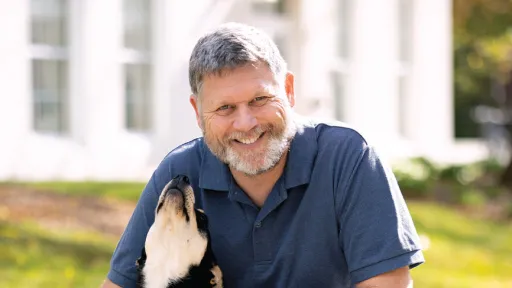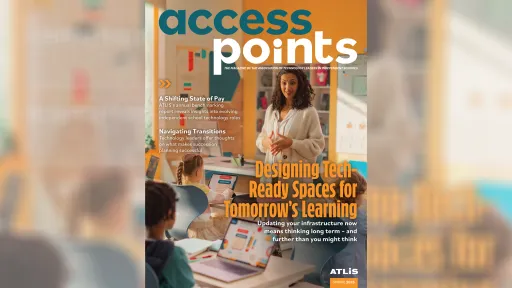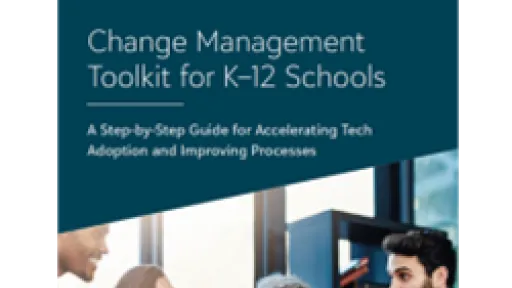If you haven't met Robert Drake, director of technology at North Shore Country Day School (NSCD) in Winnetka, Illinois, you might assume he is a normal guy doing work similar to yours. Although that's mostly true, he's so much more — a passionate ATLIS DEI Advisory Committee member, a fervent team leader, and a true inspiration to those who have had the pleasure of getting to know him.
Drake is Deaf, which means he can't hear, but he does speak. With service dog Pippa at his side, tools that help him communicate without missing a beat, an incredible school community that believes in him, and a loving and supportive wife who knows the ins and outs of independent schools as a head of school herself, Drake is the quintessential technology leader. Access Points caught up with Drake to discuss how he's making strides at NSCD — and wherever his life takes him. The following Q&A was generated using captioning and his auto AI speech-to-text software.
Access Points: What's your philosophy when it comes to leading technological and educational transformation at NSCD?
Drake: It was a unique time to start this job. Everyone was just coming out of the COVID-19 pandemic. It was a singularly unique time in education and no different in technology, given how it was utilized creatively to continue education during COVID. In part due to these increased technological needs, the school needed some infrastructure upgrades. Hybrid instruction required high bandwidth.
The first year and a half, we invested a lot of money, and we upgraded all of our networking infrastructure. We replaced all the switches, new wireless access points — we made our networking capacity a nonissue. With those needs met, I turned my attention to leadership at the school, taking on those bigger collaborations that I was initially supposed to be doing but had no time for while I was upgrading infrastructure. To me, leadership starts with being a great team player and collaborator; that's absolutely the key. A good team becomes great because it utilizes and appreciates the strengths of its members, and if you don't recognize that or appreciate that, you're not fully optimized. Investing in my teammates, in my department — the people — and supporting them is absolutely key to our success. In fact, a lot of successes I get recognized for are team accomplishments, and we share that success and recognition collectively.
We've made even more changes over the past year. We have come to recognize that the technology department as a silo in itself is an aging concept. Like many technologically progressive schools, we've come to see technology as ubiquitous. Everyone is using technology everywhere, whether they are administering, managing, or simply an end user. To really bring technological efficiencies to our school and start realizing a genuine return on investment, we needed oversight across the school that visualizes technology through these broad lenses and multiple perspectives. We have created a technology oversight committee, and it has key people from across divisions and departments that give us that 30,000-foot view of what we're doing and how we can improve on it schoolwide.
Although we have just started that this year, we have a lot of exciting projects that originate there, and we are already seeing productive changes. Naturally, there's a lot of work that comes from ideas generated at this level, including facilitating this committee, but it's really evolved my philosophy of what we can do together.
Access Points: How are you supporting diversity, equity, inclusion, and belonging at NSCD?
Drake: By being actively involved. By recognizing that it's mine and everyone else's job to be an active part of promoting DEIB, even if your school has its own dedicated DEIB person. Our DEIB person is fabulous — and it's still everybody's responsibility to be part of that process. DEIB is essential to the fulfillment of our mission. As director of technology, I also take on a leadership role within my department and with an eye toward how technology systems and processes might or might not support this mission, or what we might change, improve, or remove to better reflect DEIB best practices. My thinking is if I can take a leadership role in DEIB within my own department, then maybe that takes a little bit off the plate of the dedicated DEIB person to be able to focus on other areas of need. While I certainly can't do this alone, and I'm not trying to, I am learning a lot from our DEIB leader by engaging in the programming they are already leading and taking the time to learn more on my own and through work with the ATLIS DEI Committee. I have the benefit of knowing what Deaf-specific inaccessibility looks like, feels like, and what it looks and feels like to gain that access. That gives me some insight and a foundation for better understanding others who are in similar situations. No matter how much I think I have learned, I am always learning more, and I know I can always learn more by remaining actively involved.
Access Points: From your perspective as a member of ATLIS's DEI Committee, how can other tech leaders be more supportive of inclusive environments at their schools?
Drake: One way would be to have the very people who feel environments are not fully accessible speak from that space and share those experiences. Reading about them is good, too, but not as good as interaction and engagement on the nitty-gritty of these lived experiences. These individuals or groups might already be present in your school community, or you may have to invite them in, but those lived experiences inform our understanding of and promote creative engagement for making these spaces more accessible. Ask questions [and] try to get as close to the experience of something inaccessible as you can, especially if you are unable to experience it firsthand. Another point to make here is that language itself, not unbiased, can make untangling understanding in this space difficult. Language along with frames of reference are two items I would like to emphasize as I share my lived experience as an example. I was born Deaf. When I was young, I didn't have the language or critical thinking to understand that I was more than just a broken hearing person. “Deaf ” meant “disabled,” or at least as I understood it at the time, and who wanted to be disabled? I adopted as an identity the seemingly “less broken” hard of hearing or hearing impaired. I eventually amassed a minimal amount of critical thinking ability to be able to recognize my vulnerability and understand more articulate frames of reference to allow myself to accept my identity as a Deaf person. I now consider myself both Deaf (I cannot hear at all) and a language minority (language is, at times, inaccessible to me). I no longer consider, judge, or frame myself with respect to hearing people or ability. Digging into this a little further, consider this: There is a group of hearing people talking, and a Deaf person walks up and joins the group. They are speaking a verbal language the Deaf person cannot hear and therefore cannot understand. Another person walks up who can hear but cannot understand the language being spoken. What's the difference between the hearing person and Deaf person? Both can't access the language and therefore are language minorities, not disabled. Looking at the opposite scenario, a group of Deaf people are signing. A hearing person and a Deaf person walk up to join. Neither knows sign language. Are they both disabled? No. They simply have no access to the language. Where people get confused is they've treated all spoken languages as the frame of reference and make visual language an outsider, just like hearing people is the frame of reference and Deaf people are the outsider/disabled/hearing impaired, broken, or other. I am speaking about specifically my own experiences, not the experiences of others nor other recognized “disabilities” for which I have no lived experiences; those are experiences for others to share. We should seek the engagement with individuals or groups with direct experience with inaccessibility in order to better understand those experiences and better improve accessibility in our own spaces.
Access Points: What would you say to folks who might be unsure about how to best interact with you?
Drake: First, be yourself. Be authentic to who you are. If you're an introvert, be an introvert. If you are social and outgoing, be it! You might have to communicate a little differently, but don't be a different person than who you already are. Deaf people don't only read lips, they read people, and one of the easiest characteristics to read is authenticity. The idea is if you want to interact with me, approach how you normally would anyone else, make eye contact, and we'll figure it out together. I mostly lip-read and do it pretty well, but there are several variables that can make it difficult. That's not anyone's fault — they are just variables. Some of these are facial hair, how you speak and move your mouth (different for many people, especially those with accents), how tired my eyes are, background visual distractions, how many people in a group (one-on-one is obviously the easiest), and there are many more variables besides. For a few people, I may have to pull out my phone and use a voice translation app, but rest assured, we'll still figure it out. For meetings or phone conferences, I always bring and use a speech-to-text translator. The same applies to turning on the closed captions or the subtitle features in many videoconferencing apps like Google Meet and Zoom. I may also use American Sign Language (ASL) interpreters in larger venues, or especially when we are on our feet and mingling or there is a lot of background noise. When I have ASL interpreters with me, it's best to look at me when speaking, and I will be looking back and forth between the interpreter and you. I will also often have Pippa, my hearing dog, with me. She is very friendly and loves people and travel. She is also reading people all the time, just like me.
Access Points: What motivates you outside of your work?
Drake: My wife and I are very passionate about conservation of animals, animal habitats, and the environment. We travel a lot, and most of that travel leads to learning about both what's destroying animal habitats as well as the contributions we can make to help. I also have a service dog with me 24/7. We have to be in tune to each other's needs and figuring out what we need from each other. That connection has really impacted how I feel about and connect with all animals and where the desire to support them better comes from. I'm also a recreational and technical scuba diving instructor. I've been diving for more than 30 years. I usually bring groups of Deaf people to the Dutch Antilles, and we do lots of instruction every summer. A key part of that is teaching about and promoting marine conservation while we're diving. That's the driving force behind it. The need for environmental conservation is one of the things that almost exclusively occupies my mind.
Get to Know Robert Drake
Hometown: Chicago (now) and Seattle (previously)
Education: M.A. in critical and creative thinking, University of Massachusetts Boston
Hobbies: Pilot, recreational and technical scuba diving instructor, traveling, and anything to do with animal conservation
Favorite Famous Quote: “No time like the present.” — John Trusler
Fun Fact (Something that may surprise your peers): “I was once chased across Washington’s Puget Sound in my small boat by military gunboats that thought I was trying to harm a Trident nuclear submarine.”



